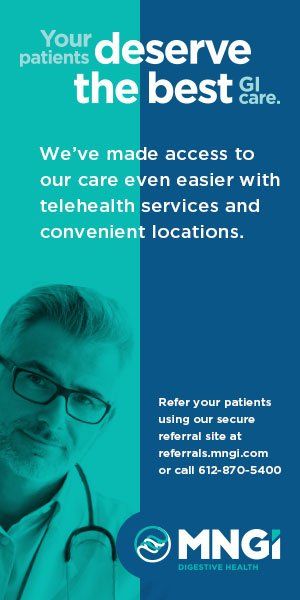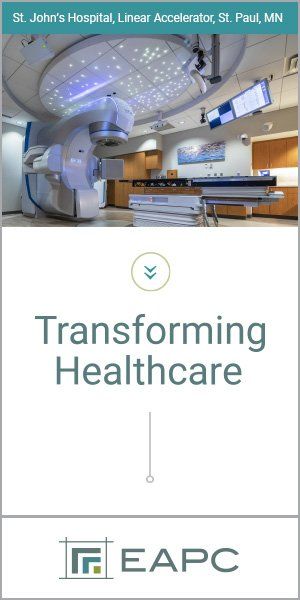Capsules
New Allina and Foundation Medicine Partnership
The Allina Health Cancer Institute recently announced a non-exclusive collaboration with Foundation Medicine to use its portfolio of comprehensive genomic profiling (CGP) tests across its cancer care network to help identify the most appropriate treatment plans for patients living with advanced cancer. “Foundation Medicine offers high-quality, well-validated comprehensive genomic profiling tests to help identify unique mutations in each individual’s cancer which may be enabling it to grow or spread,” said Dr. Badrinath Konety, MD, president, Allina Health Cancer Institute. “By reading a tumor’s genetic makeup and analyzing tumor biomarkers via tissue or blood samples, Foundation Medicine’s tests provide our physicians the precise information that can help us create a personalized cancer treatment plan for each patient.” CGP— also known as biomarker testing or tumor profiling — leverages next generation sequencing to evaluate more than 300 cancer-related genes to detect genomic mutations known to drive cancer growth. The information generated from these tests is delivered in a comprehensive report that can help oncologists identify targeted therapies, immunotherapies, or clinical trial options that are best suited to an individual patient. “While traditional chemotherapy works by killing all rapidly growing cells, targeted treatments work by killing the cancerous cells which harbor mutations identified by CGP. For some patients, targeted treatments may be easier to tolerate and may be able to be used for longer periods of time than traditional chemotherapy,” said Mike Koroscik, vice president, Allina Health Cancer Institute. “By leveraging Foundation Medicine’s tests across its cancer care network patients can receive the same high level of personalized advanced cancer care regardless of which Allina Health location and which Allina Health physician they visit.” More and more patients can benefit from molecular profiling due to the rapidly growing number of targeted therapies available today. These include novel therapies being developed for less prevalent gene alterations.
Two New Bills Support LGBTQ+ Rights
Gov. Tim Walz recently signed two important bills protecting and supporting LGBTQ+ rights. One bans conversion therapy and another protects access to gender-affirming care. This action builds on his executive order from early March that directed the Minnesota Department of Health (MDH) to compile and present a summary of existing scientific literature affirming the safety and effectiveness of gender-affirming care. The order informed all health care providers within the state that they could bill health insurance companies for gender-affirming care. After signing the new bills Walz tweeted “In Minnesota, we’re protecting rights – not taking them away.” The conversion therapy ban forbids any medical or mental health care practitioner from offering such therapy to minors and “vulnerable” adults. It also forbids any entities from publishing advertising that refers to LGBTQ+ identities as “a mental disease, disorder or illness” or promises to change a person’s sexual orientation or gender identity. Practitioners who break the law could face discipline from the state’s health licensing boards. Additionally, the law forbids insurance companies and health care plans from paying for conversion therapy. Opponents of these bills, largely following nationwide Republican agendas, claim they forbid religious-based counseling and stop people from seeking help for unwanted feelings of same-sex attraction and “gender confusion.” Mainstream medical and mental health organizations have disavowed conversion therapy as a harmful form of psychological torture. The bills forbid state legal authorities from honoring any out-of-state subpoenas or arrest warrants seeking to bring civil or criminal actions against anyone who helps provide access to gender-affirming care. While 14 states have banned gender-affirming care for transgender youth, some of these states have also had their bans temporarily blocked by courts. Minnesota is now the 22nd state to ban conversion therapy and the fifth state to protect people seeking gender-affirming care: the others are Washington, Colorado, New Jersey, and California. Rep. Leigh Finke (D), Minnesota’s first out trans lawmaker, stated, “Families who have fled are already here, and many more are planning to come. We’re going to be ready to take care of them and to provide them with the health care they need.”
U of M Researchers Develop New Biocomputing Chip
In new research recently published in Nature Communications, a diverse team at the University of Minnesota has developed a platform for a new method of biocomputing: Trumpet, or Transcriptional RNA Universal Multi-Purpose GatE PlaTform. Trumpet uses bacteria-based biological enzymes as catalysts for DNA-based molecular computing. Researchers performed logic gate operations, similar to operations done by all computers, in test tubes using DNA molecules. A positive gate connection resulted in a phosphorescent glow. The DNA creates a circuit, and a fluorescent RNA compound lights up when the circuit is completed, just like a lightbulb when a circuit board is tested. “Trumpet is a non-living molecular platform, so we don’t have most of the problems of live cell engineering,” said co-author Kate Adamala, assistant professor in the College of Biological Sciences. “We don’t have to overcome evolutionary limitations against forcing cells to do things they don’t want to do. This also gives Trumpet more stability and reliability, with our logic gates avoiding the leakage problems of live cell operations.” While Trumpet is still in early experimental stages, it has tremendous potential in the future. “It could make a lot of long-term neural implants possible. The applications could range from strictly medical, like healing damaged nerve connections or controlling prosthetics, to more sci-fi applications like entertainment or learning and augmented memory,” said Adamala. Lead author and PhD candidate Judee Sharon is using Trumpet to develop biomedical applications for early diagnosis of cancer. Another possible application is “theranostics” – combined medical diagnostics and therapeutics inside the body. For instance, a biological circuit could detect low insulin levels in a diabetes patient and activate proteins to manufacture the needed insulin. This kind of device could be small enough to circulate in the bloodstream of a patient. The research is a joint project by the Department of Genetics, Cellular Biology, and Development at the College of Biological Science and the Department of Computer Science at the College of Science and Engineering.
Blue Cross and North Memorial Dissolve Blaze Health
Blue Cross and Blue Shield of Minnesota (Blue Cross) and North Memorial Health (North) recently announced a mutual decision to dissolve a shared joint venture (JV). As a result, both organizations have agreed to terms that will end the shared ownership of the JV legal entity Blaze Health, LLC. North will regain the 49% ownership stake in 25 primary care clinics, specialty care clinics, and hospice currently held by the parent company of Blue Cross. “At North, our mission-driven teams remain focused on meeting the changing needs of the communities we serve throughout Hennepin County,” said J. Kevin Croston, MD, chief executive officer of North Memorial Health. “Blaze Health was born and launched from a pre-pandemic perspective. Just a few months later, the industry changed in ways that no one could have anticipated. I truly appreciate the collaboration with Blue Cross, both in our response to the pandemic and the work that went into the JV. I am confident we can best deliver on current and future priorities by continuing to collaborate and innovate though other approaches.” “Our new strategic plan at Blue Cross is built on the growth and expansion of value-based care initiatives with multiple care systems and providers throughout our network,” said Dana Erickson, president and CEO of Blue Cross and Blue Shield of Minnesota. “Our experience working in an integrated health care model led to many productive insights and outcomes. I value the ongoing commitment we have with North Memorial Health to improving the health of our communities and I look forward to building upon the learnings that can benefit all Blue Cross members.” Blue Cross members and North patients will not experience any disruption in their health care benefits or medical care. Both organizations are committed to ongoing collaboration. The conclusion of the JV, which launched in January 2020, will have no impact on the longstanding agreement that continues to have North as a valued participant in the Blue Cross provider network.
Essentia Graduates First Nursing Residency Cohort
In response to the health care workforce shortage crisis and working to equip new nurses with the resources they need to deliver the highest-quality patient care, Essentia Health introduced a nurse residency program in the spring of 2022. A year later, the first cohort of nurses has completed the residency. They’re thankful for the opportunity. “Having the peer support and knowing that there’s staff, or the mentors that we found, they were very willing to be there when we had questions or needed support,” said Ashlynn Murph, a registered nurse at Essentia Health-Fargo. Murph was among the 65 Essentia RNs to comprise the yearlong program’s inaugural class. They devoted four hours a month to learning about evidence-based best practices; engaging in practical hands-on exercises; teaming up on small-group projects; and connecting with some of their more experienced colleagues. The goal was to supplement their nursing-school experiences and expedite career development. When possible, course content was specific to Essentia so that attendees could get a better feel for organizational best practices. Classes were held in-person in Fargo, Detroit Lakes, Brainerd and Duluth. “I think it was cool to have that group of people that you could see every month, bounce ideas off of and just talk to,” said Kaylee Stulz, also an Essentia Health-Fargo RN. “I looked forward to the program once I realized that was something Essentia was offering.” The residency program supports Essentia’s Journey Towards Magnet Designation, a prestigious distinction that honors health care systems for creating and sustaining a culture of excellence among their nurses. “A highlight of the program is clinical reflection time, which allows nurse residents to connect and grow critical thinking and decision-making skills,” said Lana Helgeson, nursing professional development practitioner at Essentia. “The support the nurse residents receive every month from their facilitator and peers has been invaluable. I want to thank all the graduates for their hard work throughout the year and for leading our evidence-based practice journey.”
Hennepin Healthcare Expands Rehab Services
Hennepin Healthcare and Shirley Ryan AbilityLab (SRA) are joining forces to bring the services and expertise of the nation’s premier rehabilitation hospital to patients of Hennepin Healthcare. An alliance between Hennepin Healthcare and SRA will build on the legacy of high-quality care and services provided by the inpatient rehabilitation team and related therapies at Hennepin Healthcare. SRA is the global leader in physical medicine and rehabilitation for adults and children with the most severe, complex conditions – from traumatic brain and spinal cord injury to stroke, amputation and cancer-related impairment. Founded in 1953, and anchored by its flagship research hospital in Chicago, the organization operates more than 30 sites in Illinois and works with hospitals and health care systems around the world. The alliance will bring SRA’s extensive expertise, data, and analytics to Hennepin Healthcare. SRA will deploy leaders to work directly with Hennepin Healthcare rehabilitation services leadership and frontline clinical care teams. The Hennepin Healthcare rehabilitation team and related inpatient therapy teams and medical staff will remain Hennepin Healthcare employees with no change or interruption in employer affiliation or union status.” This alliance brings the expertise of the top rehabilitation hospital in the U.S. to patients who come to Hennepin Healthcare from across Minnesota and the region,” said Jennifer DeCubellis, Hennepin Healthcare CEO. “Providing patients the best in rehabilitation medicine and therapies to support them on their journey to get home faster and with optimal mobility is critical and our partnership with Shirley Ryan AbilityLab will make that possible.” As a teaching and research health care system, Hennepin Healthcare is the right partner for Shirley Ryan AbilityLab’s proven approach to improving safety, quality, and access. “Central to our mission is expanding our reach — locally, nationally and globally — so that patients have access to the best in rehabilitation care within their communities,” said Peggy Kirk, SRA president and CEO. “We look forward to sharing our clinical and operating expertise with Hennepin Healthcare.”
Children’s Minnesota Opens New Specialty Center
Children’s Minnesota has just opened a second location for specialty care services in Maple Grove. The Children’s Minnesota Primary Care and Specialty Center – Maple Grove (Bass Lake Road) is located in the same building next to the existing Partners in Pediatrics (PIP) Primary Care Clinic. The new location will allow patient families to access more services at one convenient location. “As the kid experts, access to quality care is one of our top priorities,” said Monica Schiller, vice president of ambulatory services at Children’s Minnesota. “We are excited to open our new Maple Grove location and care for more children and families in the northwest suburbs of the Twin Cities metro.” Specialties are available at the new location are: cardiovascular, ENT (with facial plastic surgery) and pediatric and adolescent gynecology. A cancer and blood disorders program is expected to open later this year.
MORE STORIES IN THIS ISSUE
cover story one
Health Care Utilization: Finding the right balance
By Zeke McKinney, MD, MHI, MPH
cover story two
A Missed Opportunity: The Prescription Drug Affordability Board













